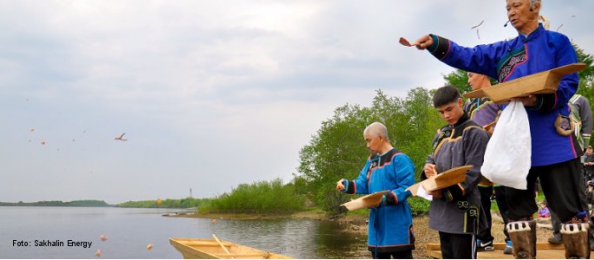Sakhalin Energy: A Complex Approach to Human Rights
Sakhalin Energy, the operator of the largest oil and gas project ever implemented in Russia, is committed to compliance with the highest international standards for respecting, supporting, and promoting human rights at all stages of its business activities.
Sakhalin Island has been called a pearl of the Far East. Stunning wild nature, rivers rich in fish, cultural diversity, and many other treasures have made this place a source of pride for its residents.
Ten years ago, Sakhalin suddenly became the site of an oil and gas boom. Thousands of workers from all over the world started flowing to the island. A new historical era began. It was natural for the local communities to have concerns, since changes always bring uncertainty: Would those changes undermine the island’s lifestyle? Would they benefit Sakhalin? Hundreds of questions demanded answers.
To give an answer, Sakhalin Energy made an assessment of potential social impacts, including human rights, as a crucial part of its agenda.
Human rights risk assessment
To provide a path for a comprehensive human rights risk assessment, the company had to take into consideration the key specifics of the project: construction to be carried out in proximity to more than 60 settlements, including fishing and gathering areas and lands traditionally used by indigenous peoples; about 20,000 workers coming to the island; multinational staff from various cultural backgrounds; and other factors were considered as carrying human rights risks.
The company pays special attention to vulnerable groups identified according to international standards, including children, non-registered land users, indigenous peoples, low-income families, among others.
This due diligence approach has allowed the company to develop appropriate mitigation measures, such as constructing bypass roads, selecting suitable locations for construction camps, minimizing the physical relocation of land users, etc. In addition, the impact assessment assisted greatly in identifying areas for partnership programs later launched by the company in host communities. Clearly, the human rights risk assessments would have no practical value in the absence of a business model in which human rights standards are embedded into all business processes.
Three inseparably connected elements allowed Sakhalin Energy to build such a model: incorporating human rights standards into key policies and procedures, effective stakeholders’ engagement, and a human rights training program.
Putting standards into practice
To give due weight to human rights commitments and make them applicable company-wide, Sakhalin Energy has incorporated them into the key policies endorsed by senior management: a Statement of General Business Principles, a Code of Conduct, and a Human Rights Policy. But these just lay the groundwork on which detailed procedures are built upon to precisely articulate how human rights standards should be implemented in each of the following critical business areas:
> employee relations
> working in communities
> contracting and procurement
> asset security
Let us consider just a few examples of the procedures that the company applies to support human rights: the Public Consultation and Disclosure Plan (describing the process of regular and transparent stakeholder engagement); the Community Grievance Procedure (covering all aspects of addressing local communities’ grievances); the Resettlement Action Plan (ensuring that resettlement of land users complies with international standards); the Construction Camps Management Procedure (regulating accommodation standards for construction camps, compliance with the Code of Conduct, and workers’ attitudes toward the natural environment and local communities).
Stakeholder engagement
The company fully realizes that merely broadcasting the company’s plans via established media is not an appropriate style of engagement for today’s world. The host communities are looking for a dialogue that enables residents to freely communicate their views and concerns about the company’s activities, and to discuss opportunities for community development.
To support community-centered dialogue, the company applies mechanisms that have proven their practicability throughout the lifetime of the Sakhalin-2 project:
> a system of direct communication with local communities
> partnerships
> a mechanism to address grievances
Direct communication with local communities
From the very beginning of the project, the company established an extensive network of community liaison officers in nine districts of Sakhalin. Because of its extremely important role in community engagement, this group has been called company’s “eyes and ears” in the host communities.
In 2009 the project moved into its operations phase, during which Sakhalin Energy faced a challenging task: to create an engagement mechanism that addressed new realities while ensuring engagement efficiency. A solution was found: the company established “Sakhalin Energy Information Centers” in 23 communities. The centers – located in local libraries – now play a significant two-way communication role: first, by providing local people with up-to-date information on the project’s development and social investment projects; and second, by communicating to the company any inquiries and concerns associated with the Sakhalin-2 project.

Partnerships
The benchmark for partnerships initiated by Sakhalin Energy is creating an environment in which the interests of all parties are harmonized to enhance the potential for sustainable development. In addition, the parties share risks and bear joint responsibility for the programs’ success.
The following partnership areas were identified in the course of impact assessments:
> education
> child safety
> road safety
> environmental protection and conservation of biodiversity
> culture and art
> support for the development of Sakhalin indigenous minorities
In some cases, the implementation of partnerships by Sakhalin Energy has had an impact far beyond the local level. For example, Sakhalin Energy used its vast experience of engagement with Sakhalin indigenous peoples to contribute to the development of the Business Reference Guide to the UN Declaration on the Rights of Indigenous Peoples. This guide provides recommendations on respecting and supporting indigenous peoples’ rights for businesses worldwide.
Grievance mechanism
Since 2011, when the UN Guiding Principles on Business and Human Rights were established, it has become generally accepted that efficient, non-judicial grievance mechanisms play a major role in promoting human rights. However, back in 2002, when Sakhalin Energy first began implementing its community grievance procedure, such mechanisms were not widely used around the world. The company became a pioneer in this field.
During the project, Sakhalin Energy has addressed some 500 grievances, held more than a thousand meetings with their initiators, and made hundreds of visits to Sakhalin communities to monitor the grievance-resolution process.
From 2009 to 2011 Sakhalin Energy participated in testing the so-called Ruggie Principles related to corporate grievance mechanisms. The company was one of five worldwide selected for implementation of this project, and the mechanism implemented by the company has been acknowledged by international experts as one of the most comprehensive in the industry.
| Initiator | Sakhalin Energy |
| Project start | 2009 |
| Status | Ongoing |
| Region | Russian Federation, Sakhalin |
| Contact person | Valentin Zhovtun |
| Awards |
| Anti-Corruption | - |
| Business & Peace | - |
| Development | - |
| Environment | - |
| Financial Markets | - |
| Implementing UNGC Principles in your Corporate CSR Management | X |
| Human Rights | X |
| Labour Standards | - |
| Local Networks | X |
| Advocacy of global issues | X |
| Business opportunities in low income communities/countries | - |
| Project funding | - |
| Provision of goods | - |
| Provision of services/personal | X |
| Standards and guidelines development | - |
- Local communities
Human rights training
The company’s compliance with human rights commitments depends on the decisions and actions of its personnel. It is therefore clear that an appropriate awareness of human rights is required. To address this task, the company has arranged regular training sessions for its staff, contractors, and other stakeholders. A range of general and specific courses that cover human rights standards are mandatory for all employees of the company and its contractors. They include such topics as the grievance process, anti-corruption measures, security and human rights, and the company’s code of conduct.
In conclusion, let us refer to the UN International Forum on Business and Human Rights, held in Geneva. The key idea of the Forum discussions in 2014 was that businesses today have been provided with comprehensive guidance on how to respect, support, and promote human rights. The time has come to demonstrate them in action. This article provides a very basic outline of our company’s experience with how the ideas included in the UN Guiding Principles, and other documents published under the Guiding Principles umbrella, can be transformed into daily business practices.
Valentin Zhovtun is Social Performance Adviser at Sakhalin Energy.
Sakhalin Energy Investment Company Ltd. (Sakhalin Energy) is a consortium for developing the Sakhalin-II oil and gas project with corporate head office in Yuzhno-Sakhalinsk. The chief executive officer is Roman Dashkov. The company's principal activities are the production and export of crude oil (since 1999) and liquefied natural gas (from 2009).
Source: Wikipedia
Write a comment about this page
Your comments are provided by your own free will and you take sole responsibility for any direct or indirect liability. In order to maintain the highest discussion quality, all comments will be reviewed by our editors. You hereby provide us with an irrevocable, unlimited, and global license for no consideration to use, reuse, delete or publish comments in accordance with our Community Guidelines.
About Us // Privacy Policy // Copyright Information // Legal Disclaimer // Contact
Copyright © 2012-2018 macondo publishing GmbH. All rights reserved.
The CSR Academy is an independent learning platform of the macondo publishing group.









